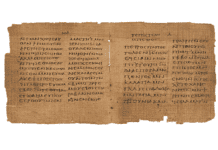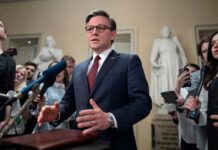Tyler said Texas already has strong protections, pointing to the state’s Religious Freedom and Restoration Act “that we believe provides the right balancing standard to decide issues in the free exercise rights of individuals and communities (that) might come into conflict with government interests.”
“I would hope that the voters of Texas would understand the strong protections for free exercise that they already enjoy and understand that this extra provision in the Constitution is unnecessary, over broad and could actually jeopardize the health and safety of their communities,” Tyler said.
In a column opposing the measure in El Paso Matters, David Marcus of Join Us for Justice, the El Paso chapter of Americans United for Separation of Church and State, wrote that Proposition 3 “could have deadly consequences if the COVID-19 pandemic worsens or if we face a more contagious virus.”
The headline of a Houston Chronicle editorial urged voters to vote “No” on the proposition “that goes too far,” arguing the measure “ties the hands of officials trying to keep people safe.”
But to John Greiner, who pastors Glorious Way Church in Houston, this measure is crucial. Last year, Greiner joined three other pastors in filing a petition with the Texas Supreme Court calling for Harris County Judge Lina Hidalgo’s order — that banned closed churches in the midst of COVID-19 — to be deemed unconstitutional.
From the pulpit, Greiner has preached about the importance of voting in favor of Proposition 3. And through his My God Votes campaign, Greiner wants to empower faith leaders to take a stand on issues surrounding religious freedom.
“We’re trying to let people know that the church ought to provide voting guidance for people and help them make an educated Christian decision when they go to the voting booth,” Greiner told RNS, adding that in this case it means voting “Yes” on the measure.
“When everyone else was closed, we got a tremendous response from the faith community because many of them were very upset that their pastor closed their churches and limited their services to livestream,” he said. “We had a lot of people that came to our church while theirs were closed and some of them never went back. Some of them stayed with us.”
To Greiner, individual churches and people who go to church “should be in charge of their own health care decisions, their own risks to reward behaviors.”
“The church should be the place where people go to get healed. There’s lots of churches and some don’t believe in healing. … They should be free to close if that’s what they want to do, but I don’t think that the government should impose that upon any group at all,” Greiner said.
This article originally appeared here.











